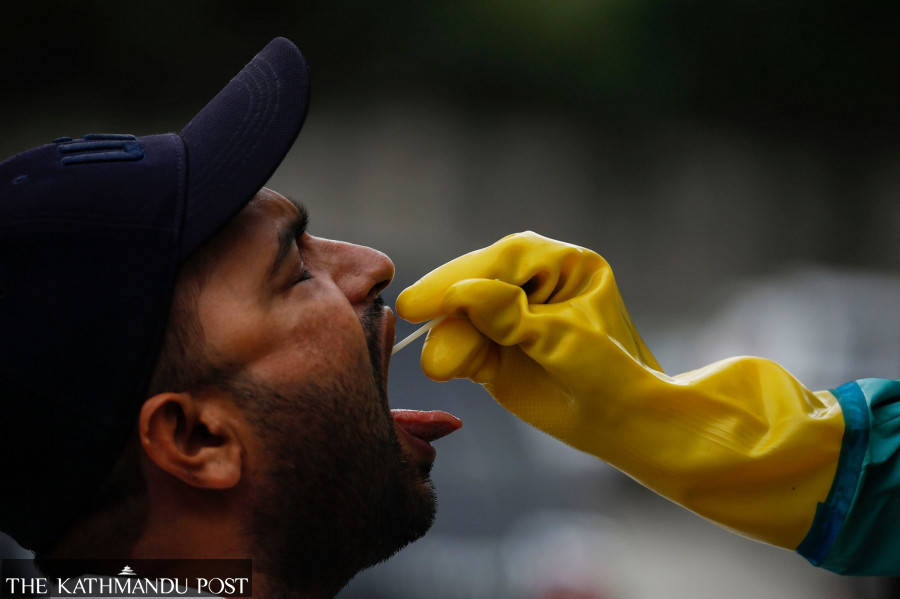Health
As mobility increases, PCR test numbers are declining
In the last one week 59,976 polymerase chain reaction tests were performed throughout the country, which showed 5,452 positive results.
Arjun Poudel
With the government lifting all restrictions imposed to contain the spread of Covid-19, complacency has grown in all sectors with public health measures being ignored amid increased public mobility.
What is concerning is that the number of polymerase chain reaction tests have also declined of late and authorities do not seem concerned about the growing risks.
Between September 31 and October 5, Province 2 did not conduct any polymerase chain reaction tests for two days and officials are unaware of the number of antigen tests carried out in the province.
Between September 31 and October 5, Province 2 did not conduct any polymerase chain reaction tests for two days and officials are unaware of the number of antigen tests carried out in the province.
Altogether 371 polymerase chain reaction tests were carried out in the province between September 31 and October 5, with swab samples of 26 people testing positive.
On Wednesday 769 tests were carried out that showed six people infected with Covid-19.
“Yes, the number of tests is dismal in our province,” Dr Shrawan Kumar Mishra, chief of the Provincial Public Health Laboratory, told the Post over the phone from Janakpur. “People are not seeking tests in our province and infection rate is also not very high here.”
Although infection rate is low in Province 2, compared to other provinces, it is still higher than the threshold recommended by the World Health Organisations for reopening.
The World Health Organisation also said that the positivity rate should be less than five percent to relax social restrictions and the province still has around 7 percent test positivity rate.
And what is concerning is that all the eight districts of the province border India, from where thousands of Nepalis enter the country every day. Moreover, the province is densely populated.
In the last six days 328 polymerase chain reaction tests were performed in Karnali Province which showed 117 positive results. Test positivity is around 36 percent.
In Sudurpaschim Province, 419 tests were carried out in the same period which showed positive results in swab samples of 108 people. Daily test positivity rate of the province in the last six days is around 22 percent.
In the last one week 59,976 polymerase chain reaction tests have been performed throughout the country, which showed 5,452 people positive. Test positivity rate is over 9 percent.
Doctors say, when enough testing is not done, people of the particular area, who are infected with the virus, do not become aware of their infected status which means they don’t get isolated from other family members.
“New cases of Covid-19 are being reported from across the country,” Dr Keshab Deuba, a public health epidemiologist, told the Post. “This means the virus is still circulating in communities throughout the country and the chain of infection has not broken.”
Mishra concedes that the risk of the infection spreading is very high in the districts of the province, as testing is minimal.
“Only those hospitalised after getting severe and those needing a negative test report to go abroad are seeking tests in the province,” said Mishra. “Even the people having flu-like symptoms are not seeking tests in our province as severity of the infection has declined. And people are not as scared of Covid-19 as in the past.”
Doctors say there could be hundreds of other cases in communities, as tests are not being done, contact tracing stopped months ago and active surveillance is not being done.
Tests are not being done but that’s not because the province lacks laboratories, testing kits or human resources. All eight districts of the province have laboratories to carry out polymerase chain reaction tests, trained human resources and testing kits.
Officials concede that lack of interest to collect swab samples, carry out contact tracing and active surveillance hinder testing in the province.
“Only the way to know the infection status in the communities is to carry out testing. When we stopped testing, how could anyone know the actual condition of the infection,” said Dr Sarad Onta, a public health expert. “We are not carrying out the tests means we are not serious towards the risk of infections.”
The Ministry of Health and Population had recently issued a circular to all agencies concerned to increase testing especially in the districts bordering India and of the returnees.
All the districts of Province 2 have numerous border points and dozens of illegal land crossings. Despite the circular of the ministry, testing has not been ramped up in those districts.
“Since the beginning, testing has not been carried out in sufficient numbers in the districts of Province 2,” Dr Krishna Prasad Paudel, spokesperson for the Health Ministry, said. “We are aware of the haltage in testing there and have been discussing with officials ways to increase testing.”
According to Paudel, he held a meeting with the provincial health director of Province 2 on Wednesday and discussed ways to increase community engagement and contact tracing.
Meanwhile, Nepal on Thursday reported 667 new cases of Covid-19 and eight deaths from the disease. The total deaths from Covid-19 in Nepal since the start of the pandemic has reached 11200.




 11.84°C Kathmandu
11.84°C Kathmandu















